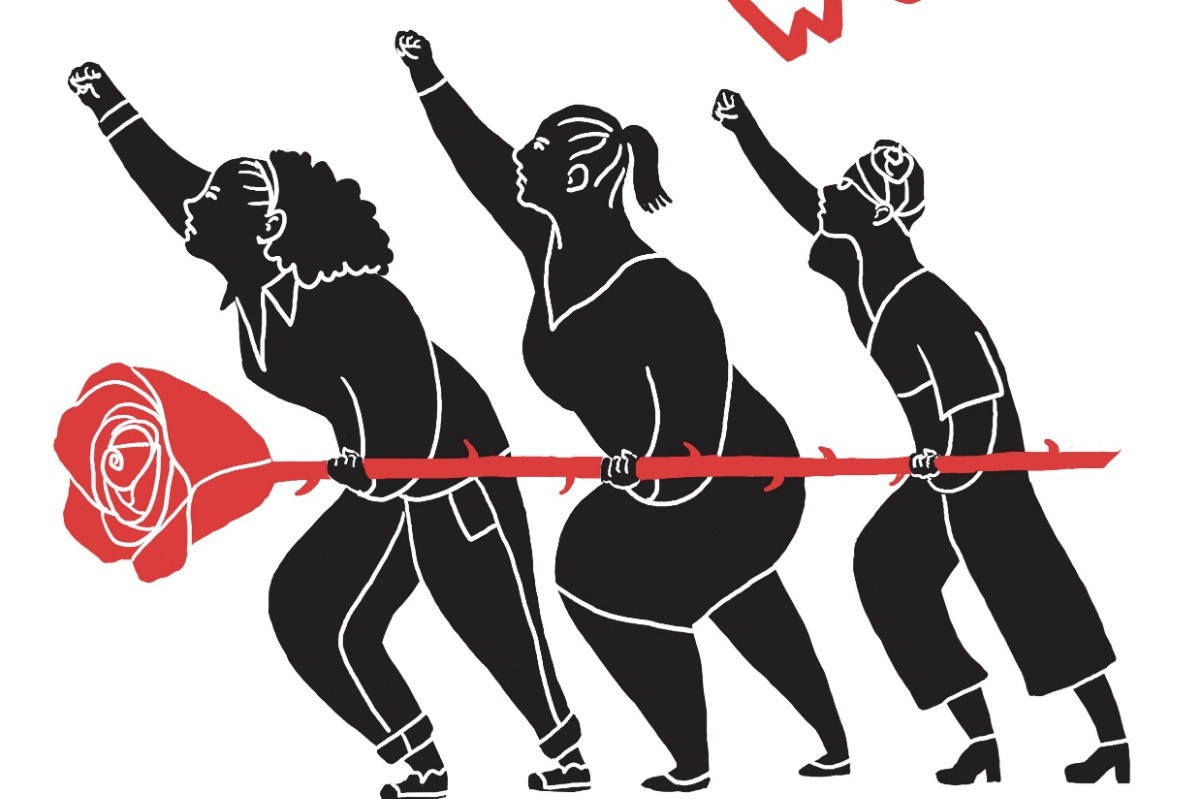Last weekend, the Philadelphia Socialist Feminist Working Group hosted over 200 socialist feminists from all over the U.S. for the Socialist Feminist Convergence, a three day conference of talks, workshops, skill sharing and relationship building with the goal of developing a shared strategy for winning anti-racist socialism in our time. The program was packed with everything from panels on prison abolition and setting up childcare programs in organizing spaces to talks on organizing in feminized jobs and the feminization of municipal politics to workshops on consciousness-raising and clothing alteration. While the convergence was dedicated specifically to socialist feminism, the organizers built the program around the principle that there can be no socialism without intersectional feminism, and the large variety of talks made it clear that socialist feminism is not “of interest” to just non-cis men, but is absolutely vital to anyone fighting for a better world.
Every exchange in the convergence was infused with this spirit, both in the macro level discussions on large, outward facing campaigns and movements to the micro level of how we organize within our own chapters. In a conversation about mentoring future labor leaders PASNAP President Patty Eakin and CWA organizer and DSA Labor Branch member Sandra Lane spoke about the need for organizing for community needs while organizing for workplace victories, and how a good organizer doesn’t differentiate between the two. “I would love to see the day when a hedge fund is not allowed to own a hospital,” Patty Eakin said to considerable snaps from the audience. Later that day, Elizabeth Fetterolf and Landry Levine from NYC DSA discussed the importance of centering childcare in our socialist organizations, for, as Elizabeth stated, “Winning movements are led by caregivers.” And in a discussion about the new book Feminism for the 99%: Manifesto, Cinzia Arruzza highlighted the importance of socialist feminism on the international stage: “In many countries, the feminist movement is the way that class politics is being reconfigured.”
I participated in a panel on defending reproductive rights with seven other activists from around the country, sharing my experiences organizing in the TCDSA clinic defense working group. From comrades in NYC SocFems and Socialist Alternative, I learned about the struggle for legal abortion access in Ireland and Argentina and how socialist feminists in those countries are making reproductive rights a front-and-center demand in working class politics. From a comrade in southern Ohio, I picked up my new favorite chant for clinic defense: “1 2 3 4! Abortion bans are class war! 5 6 7 8! Workers will retaliate!”
The plenary was given by Tithi Bhattacharya, a prominent Marxist feminist, longtime activist for Palestinian justice, and one of the national organizers of the International Women’s Strike on March 8, 2017. She spoke to a packed room of 150 socialist feminists as we all ate lunch together, opening the hour by encouraging us all to host fewer meetings with structured agendas and more with communal meals and with children running at our feet. She led the talk with the need to close the perceived gap between socialist feminist organizing and class organizing, calling for insurgent care and centering life making in all social struggles and asserting, “Care is not only an individual act. Care includes all infrastructures that reduce the injuries of class: schools, parks, hospitals, transportation.” She tied all of our struggles to ecosocialism, pointing out that fate of the social world and the natural world are now co-constitutive. She implored us to tie our struggles together at every level and to build a movement based on people, not just politicians. “If we get to a place where a left movement is solely reliant on an electoral insurgent movement, we are doomed,” she declared, and the room erupted with applause.
I returned from the weekend feeling invigorated, restored and inspired. The entire Convergence was organized by just ten SocFem comrades under almost hostile conditions and with very little support from their chapter’s steering committee. Yet, in these less than ideal circumstances, the organizers of the conference built something much larger, more beautiful and expansive than the internal politics of one chapter. They created an opening for a robust socialist analysis that effectively counters patriarchal domination and builds class solidarity. And this, to me, is one of the greatest strengths of socialist feminist organizing– the determination to not resign ourselves to the rules, laws and world they are, but to reimagine and recreate them for the benefit of all.
As Tithi Bhattacharya said in her plenary, “We have to INCITE movements rather than CONTAIN movements.” Thank you, SocFems of Philadelphia, for leading by example.
Mandy M.

